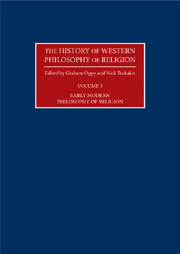Book contents
- Frontmatter
- Contents
- Editorial Introduction
- Contributors
- 1 Early Modern Philosophy of Religion: An Introduction
- 2 Niccolò Machiavelli
- 3 Martin Luther
- 4 John Calvin
- 5 Michel de Montaigne
- 6 Francisco Suárez
- 7 Thomas Hobbes
- 8 René Descartes
- 9 Ralph Cudworth
- 10 Blaise Pascal
- 11 Baruch Spinoza
- 12 John Locke
- 13 Gottfried Wilhelm Leibniz
- 14 George Berkeley
- 15 Voltaire
- 16 The Deists
- 17 Jonathan Edwards
- 18 Thomas Reid
- 19 David Hume
- 20 Denis Diderot
- 21 Immanuel Kant
- 22 Gotthold Ephraim Lessing
- 23 William Paley
- Chronology
- Bibliography
- Index
19 - David Hume
- Frontmatter
- Contents
- Editorial Introduction
- Contributors
- 1 Early Modern Philosophy of Religion: An Introduction
- 2 Niccolò Machiavelli
- 3 Martin Luther
- 4 John Calvin
- 5 Michel de Montaigne
- 6 Francisco Suárez
- 7 Thomas Hobbes
- 8 René Descartes
- 9 Ralph Cudworth
- 10 Blaise Pascal
- 11 Baruch Spinoza
- 12 John Locke
- 13 Gottfried Wilhelm Leibniz
- 14 George Berkeley
- 15 Voltaire
- 16 The Deists
- 17 Jonathan Edwards
- 18 Thomas Reid
- 19 David Hume
- 20 Denis Diderot
- 21 Immanuel Kant
- 22 Gotthold Ephraim Lessing
- 23 William Paley
- Chronology
- Bibliography
- Index
Summary
David Hume's (1711–76) interest in the relationship of religious belief to reason began no later than his early teens and lasted his entire life. Many scholars situate this interest in the broader context of Hume's evidentialism, his empiricism and his scepticism. There is no doubt that his evidentialism, his belief that “A wise man … proportions his belief to the evidence” ([1748] 1975: 110), together with his empiricism, his view that “experience [is] our only guide in reasoning concerning matters of fact” (ibid.: 110), are the guiding principles of his religious epistemology. It is doubtful, however, that his scepticism plays an equally important role, although it obviously plays some role. Although Hume did hold that reasoning is not the cause of most religious belief, trying to understand that position in terms of his more radical sceptical views about the limitations of reason is apt to mislead for two reasons.
First, Hume notoriously wore many hats (sceptic, naturalist, logician, historian, etc.), and the hat he wore when he focused his attention on religion was rarely that of the radical philosophical sceptic. This is obvious in his work on the anthropology, history, sociology and psychology of religion, but it is no less true when he was engaged in what we would today call the philosophy of religion. For example, his critique of the design argument is, as we shall see, based on principles of inductive logic explained in Hume's Treatise on Human Nature (cf. Barker 1983). Thus, that critique assumes that some inductive reasoning is good and some bad, and so is not based on any general scepticism about induction. Further, even if Hume was a causal sceptic, which is debatable, he did not base his critiques either of belief in miracles or of the cosmological and design arguments on such scepticism, and his “physical arguments” for the mortality of the soul appear to presuppose causal realism.
- Type
- Chapter
- Information
- The History of Western Philosophy of Religion , pp. 249 - 262Publisher: Acumen PublishingPrint publication year: 2009



